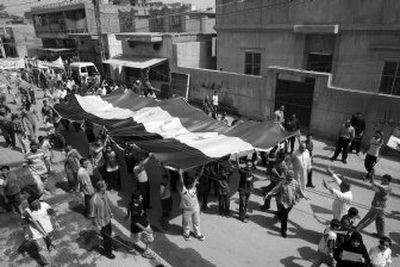9 U.S. soldiers killed in Iraq

BAGHDAD – Nine U.S. soldiers were killed and 20 wounded Monday in a suicide car bombing against a patrol base northeast of the capital in Diyala province, a volatile area that has been the site of fierce fighting, the military said.
The attack came on a day when insurgents struck across Iraq, carrying out seven other bombings that killed at least 48 people.
Of the 20 wounded in the attack on Task Force Lightning in Diyala, 15 soldiers were treated and returned to duty while five others were evacuated to a medical facility for further care, the military said. An Iraqi civilian was also wounded.
Identities were not released pending notification of relatives.
It was the second bold attack against a U.S. base north of Baghdad in just over two months and was notable for its use of a suicide car bomber.
On Feb. 19, insurgents struck a U.S. combat post in Tarmiyah, about 30 miles north of Baghdad, killing two soldiers and wounding 17 in what the military called a “coordinated attack.”
It began with a suicide car bombing, then gunfire on soldiers pinned down in a former Iraqi police station, where fuel storage tanks were set ablaze by the blast.
Militants have mostly used hit-and-run ambushes, roadside bombs or mortars on U.S. troops and stayed away from direct assaults on fortified military compounds to avoid U.S. firepower.
Also Monday, U.S. officials signaled that they might reconsider putting a three-mile concrete barrier around a Sunni Arab neighborhood in Baghdad after Iraq’s struggling prime minister came under pressure from Sunnis and ordered the project halted.
Plans for the separation barrier to protect the Azamiyah neighborhood were in doubt after Prime Minister Nouri al-Maliki criticized the idea of creating “gated communities” to separate Baghdad’s sectarian neighborhoods.
Speaking during a tour of Sunni-led Arab countries, the Shiite Muslim prime minister said he did not want the 12-foot-high wall planned for Azamiyah to be seen as dividing the capital’s sects.
Iraq’s Sunni Arab minority dominated during Saddam Hussein’s reign, and its members remain deeply distrustful of Shiite intentions and provide the backbone of the Iraqi insurgency.
Shiite militias, in turn, have been attacking Sunni neighborhoods in retaliation for insurgent attacks on their own communities.
Azamiyah’s Sunni residents have been the target of frequent mortar attacks by Shiite militants, but hundreds of people in the district took to the streets to protest against the wall that they said would make their neighborhood “a big prison.”
The new American ambassador to Iraq, Ryan Crocker, defended the barrier plan Monday, saying it was an effort to protect the Sunni community from surrounding Shiite areas, not to segregate it.
Holding his first news conference since taking his post, Crocker said security measures were implemented in coordination with the Iraqi government. “Obviously, we will respect the wishes of the government and the prime minister,” he said, although he did not say construction would halt.
Al-Maliki said he would not allow “a separation wall,” but then he said that the subject would be discussed and that he would not rule out all barriers, such as barbed wire.
Iraq’s chief military spokesman indicated that some type of barrier would go up, saying al-Maliki was responding to exaggerated reports about the wall.
The confusion over the barrier reflected a lack of coordination between al-Maliki’s government and the U.S. military even as they have touted their partnership during the nearly 10-week-old security operation in Baghdad.